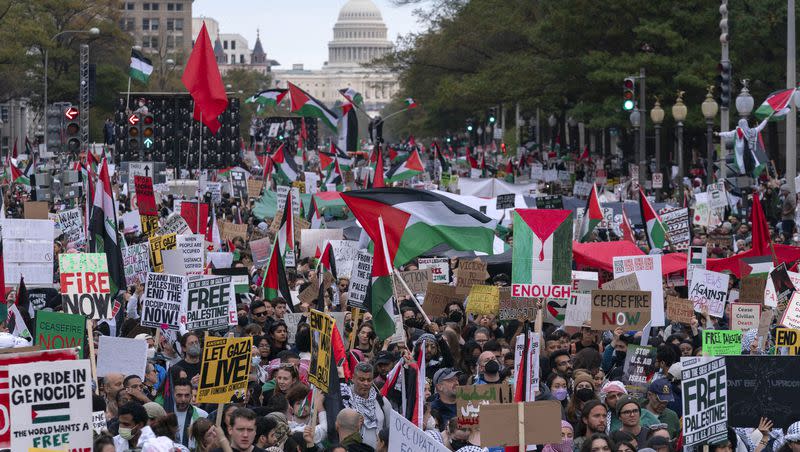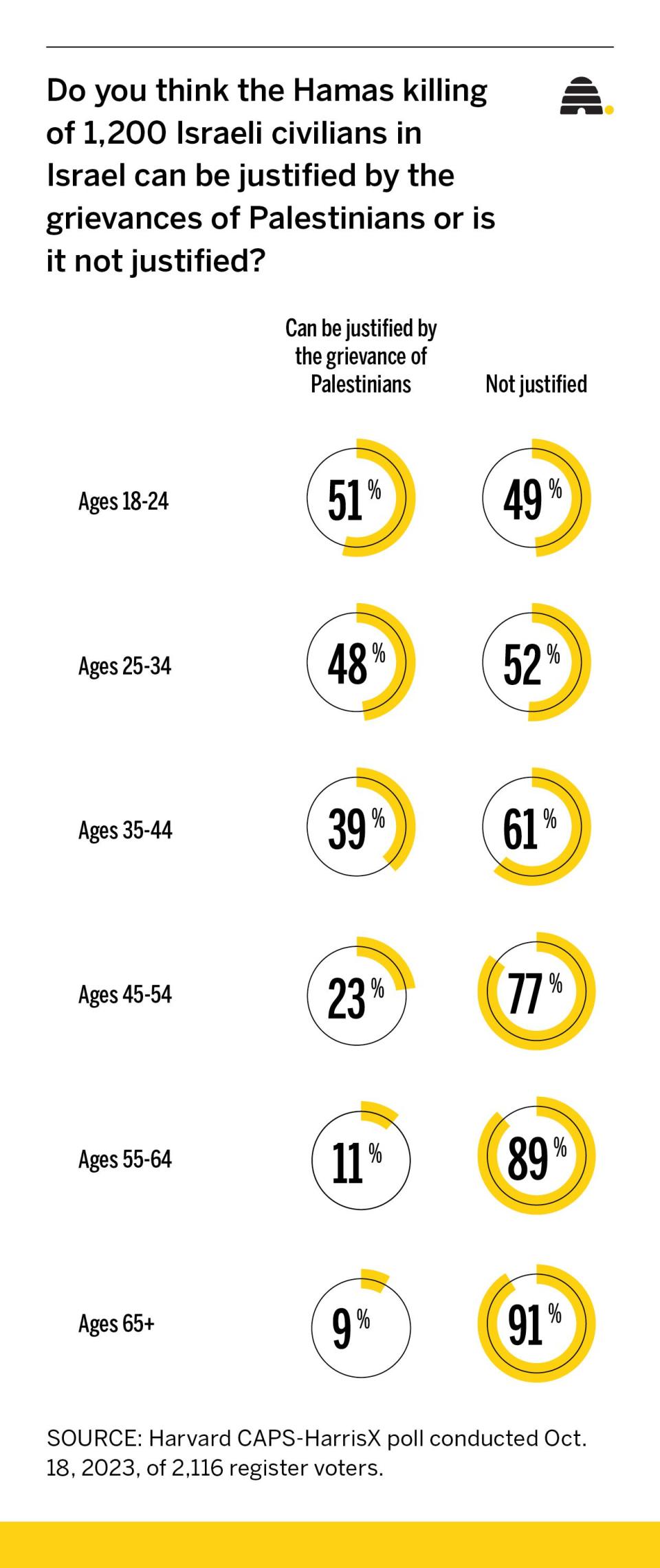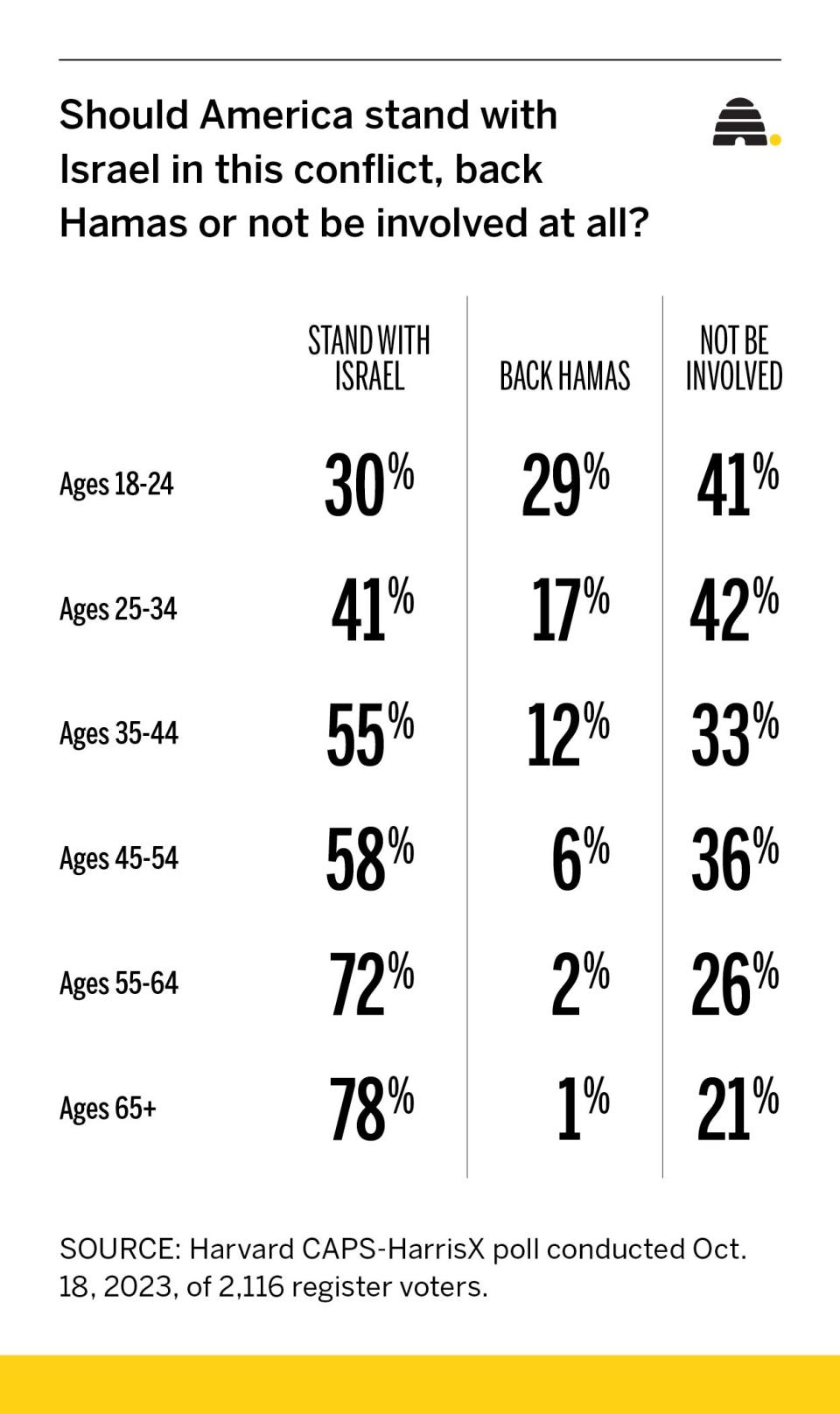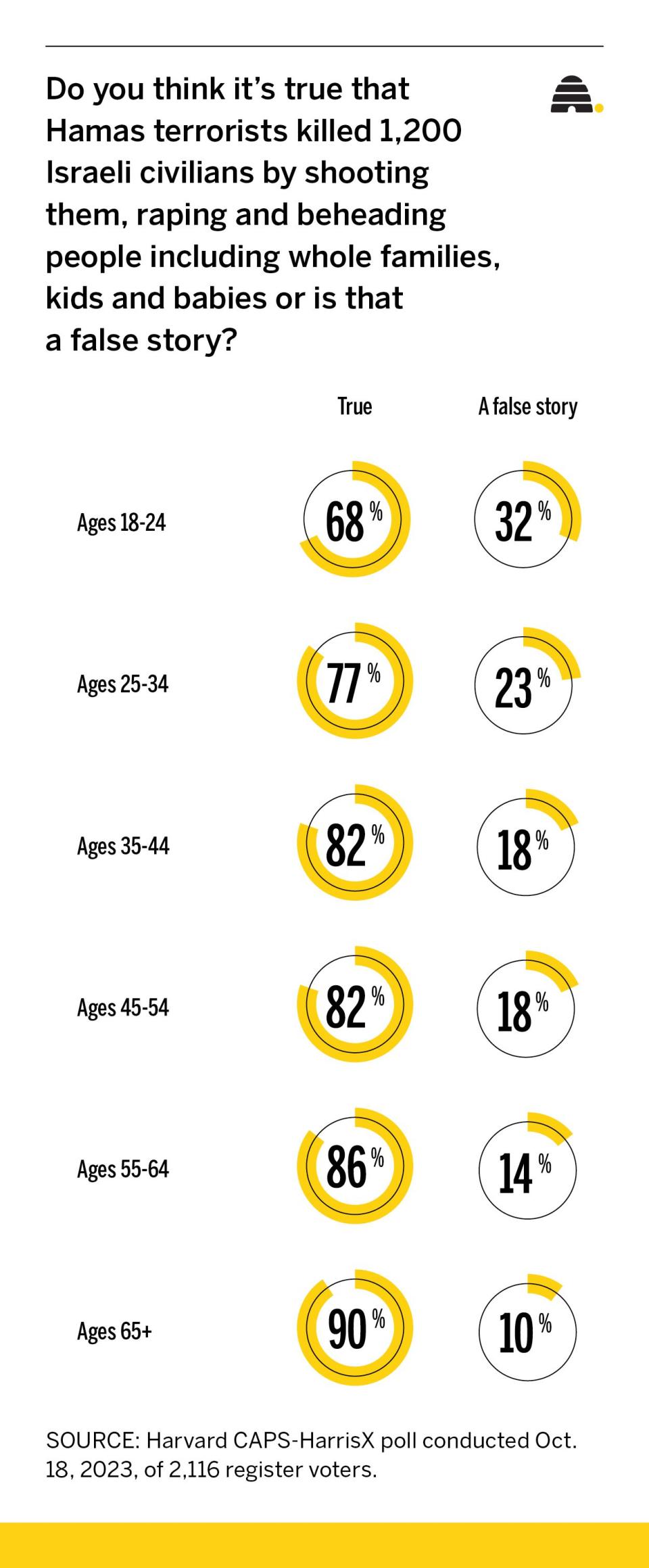Why is support for Israel lower among Gen Z and millennials?

- Oops!Something went wrong.Please try again later.
A little over a month ago, Hamas attacked Israel and brutally killed over 1,400 Israelis including innocent civilians and children. Shortly after the attack, a group of Harvard student organizations released a letter blaming Israel.
The student organizations were met with outrage and broad condemnation. As campuses have increasingly seen threats of violence against Jewish students and an uptick in antisemitism, part of the public reaction has been bewilderment over the students’ response.
A key question has emerged: Are younger generations less supportive of Israel than older generations? Recent polling sheds light on this question.
Related
Are younger generations less supportive of Israel?
The big picture: Initial polling data shows that Gen Z and millennials are less likely to support Israel than older generations. This differs by a significant degree from poll to poll, but is a general trend.
The details: A Harvard CAPS-Harris X poll was conducted a day after The New York Times reported on a hospital blast in Gaza (originally, the Times attributed the blast to Israel via Hamas officials, but the U.S. later said intelligence pointed to a stray rocket from Gaza).
The poll found that a slight majority of 18- to 24-year-old respondents (51%) said they believed killings of Israeli citizens by Hamas, a U.S State Department designated terrorist group, could be justified by the grievance of Palestinians. The 25-to 35.-year-old group wasn’t far behind with 48% of them also expressing that sentiment.
By contrast, the vast majority of older Americans, including those aged 55 to 64 said the killings could not be justified (89%) with modestly higher support from those 65+ (91%).

American Enterprise Institute Senior Fellow Samuel Abrams said in an interview with the Deseret News that the younger generations’ lack of support for Israel corresponds with other trends he’s seen.
“We are living in an enormous historical deficit. We are not having conversations with the past. One thing Judaism believes in and (Latter-day Saints) and others is that, of course, we recognize the past and study the past,” Abrams said. “The older generations in the polls know this and they’ve studied the past. They understand this.”
“Younger folks don’t know any history and they’re not being taught any history,” he added, explaining how he believes younger generations don’t understand the history of the land of Israel and the Jewish people’s connection to the region.
Other polls taken immediately after Hamas attacked Israel asked different questions:
An Economist/YouGov poll found that Gen Z and younger millennials were the group most likely to say their sympathies were with Palestinians. Slightly more of them said their sympathies were with Israel, but their support was significantly lower than the general public.
A NPR/PBS NewsHour/Marist Poll conducted a couple of days after Israeli forces started fighting back showed Gen Z and millennials were divided over whether or not Israel’s response was “about right” or “too much.”
A couple days over a week into the Israel-Hamas war, results of a Quinnipiac University poll indicated that the majority of Gen Z and millennials opposed the U.S. sending military equipment to Israel.
“With young voters the exception, there is overwhelming support for making sure Israel has the arms it needs. Which side is to blame for the spiraling crisis? No ambivalence ... it is Hamas, say registered voters, who deeply worry the conflict could metastasize and consume the Middle East,” Quinnipiac University polling analyst Tim Malloy said in the poll’s press release.
The polls track a general trend: Gen Z and millennials are less likely to support Israel than older generations. The polls conducted closer to the initial attack by Hamas indicate higher support for Israel than the Harvard poll — but across the board, younger generations consistently and significantly differed from the general American public’s support for Israel.
The Harvard CAPS-Harris X poll didn’t ask about military aid specifically, but did ask about whether or not the U.S. should stand with Israel.
Thirty percent of those between ages 18 and 24 responded in the affirmative, while 41% of respondents who are 25 to 34 also said yes. All other generations above age 35 said the U.S should stand with Israel.

The poll also asked a key question about whether or not people believed that Hamas terrorists actually “killed 1,200 Israeli civilians by shooting them, raping them, raping and beheading people including whole families, kids and babies” or if they thought it was “a false story.”
Across the board, the majority of respondents said they believed it was true that this happened. The highest percentage of those who said it was a false story were between 18 and 24, at 32%.
Related

One possible explanation for why some members of Gen Z seems much more likely than any other generation to say that they think Hamas didn’t actually brutally kill civilians may be connected to where they get their news.
TikTok has become the news outlet of choice among younger generations, with some saying that antisemitic content on the app has fomented anti-Israel sentiment.
In a letter written on Tuesday obtained by NBC News, Sen. Josh Hawley, R-Mo., wrote to Treasury Secretary Janet Yellen saying that TikTok should be banned.
Citing the Harvard CAPS-Harris X poll’s finding that younger generations are more likely to believe that Hamas’ attack could be justified, Hawley wrote, “Analysts have attributed this disparity to the ubiquity of anti-Israel content on TikTok, where most young internet users get their information about the world.”
A spokesperson for TikTok told The Hill, “There is no basis for these claims. The content on TikTok is generated by our community, and recommendations are based on content-neutral signals from users, and nothing more.”
The takeaways:
Gen Z and millennials are less likely than the general public to support the U.S. giving aid to Israel during the war.
Gen Z has more sympathy for Palestinians than any other generation.
Around one-third of Gen Z denies that Hamas attacked Israel.
What does this mean?
College campuses have emerged as a visible manifestation of tensions among Gen Z over the Israel-Hamas war. After the initial Harvard letter, other campus student organizations weighed in, including Columbia Students for Justice in Palestine who wrote that Palestinians’ “right to resist is enshrined in international law.”
They described Hamas’ terrorist attack on Israel as a “counter-offensive” and condemned an email sent by general studies Dean Lisa Rosen-Metsch because they said it “obfuscated Palestinian resistance as ‘terrorism.’”
Since then, campuses have become hot spots for protests. At major universities like University of Massachusetts-Amherst and Tulane University, violence has occurred.
On Friday, a University of Massachusetts-Amherst student “was arrested for allegedly punching a Jewish student and spitting on Israel’s flag during a vigil hosted on campus,” according to NBC News.
In late October at Tulane University, several arrests were made after violence broke out during a rally. “Three Tulane students were assaulted at a rally ... TUPD also apprehended a suspect last night for an act of antisemitic vandalism (graffiti) to a building near campus,” according to a university statement.

